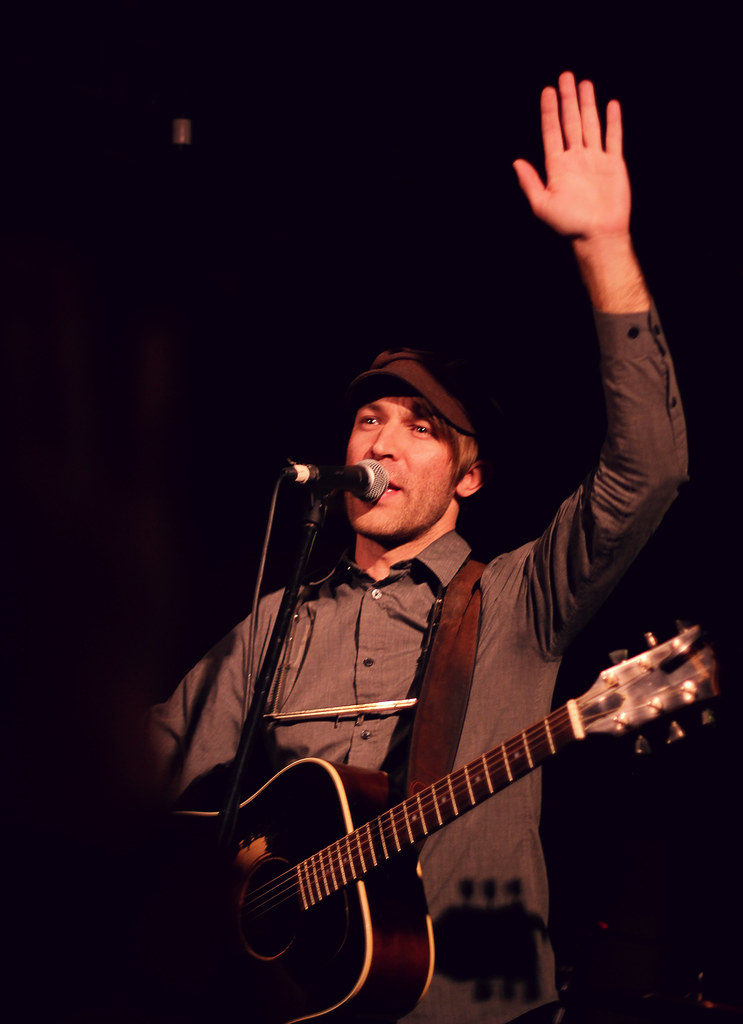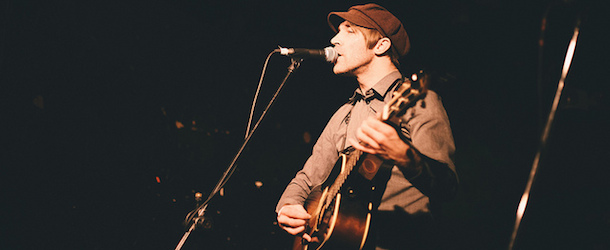[Editor’s note: This story previews Orion Walsh’s album release show at Lincoln’s Vega on Thursday and Omaha’s Venue 51 on Friday.]
by Chance Solem-Pfeifer
After his most recent show in Portland, a fan approached Orion Walsh. The singer/songwriter was performing from his new album The Tale of a Broken Compass, and he recalled the surprising plainspeak of the interaction:
“They said, ‘You know, that’s really dark music…’
“And I said, ‘Yeah!’”
While Walsh, a semi-regular resident of both Lincoln and the Pacific Northwest, isn’t fanatic about challenging the listener’s ear, on the title track of this album he sings, “I was sent here to sing the truth, not to tickle your ears or make you feel good…” The opening three songs of The Tale of a Broken Compass are all bound by haunting, repeating riffs that structurally are a far cry from where Walsh started out playing country folk music a little less than a decade ago.
This Thursday at 9 p.m., Walsh releases The Tale of a Broken Compass at Vega in Lincoln with Bolzen Beer Band, Jack Hotel and Jordan-Morgan Lansdowne. Walsh celebrates the release in Omaha on Friday at 9 p.m. at Venue 51.
Going back a few years, the balladic qualities of 2008’s Tornado Lullabies rely on a chord structure. By contrast, the brand-new track “When The Hangman Calls” trades orchestration for growth from a single point: one banjo riff, one vision of freedom that breeds five and a half minutes of chain-gang poetry.
“‘When the Hangman Calls’ is the story of a prisoner,” he says. “He escapes and has a new life, even if we don’t know what it looks like. And it also correlates to me because even though I’ve never been to prison, there’s this idea of these chains being broken. That’s why sometimes at show I’m like, ‘Raise your hand if you’ve been to jail.’ I’m just having fun.”
On the larger scale, Walsh simply is not as interested in genre, categorization or self-censorship as he once was.
“Some shows I still put a lot more country music into it, but now it’s more like ‘this is what I’m going through’ and I’m going to write about it,” he says. “I used to say I’m not going to write about relationships, I’m only going to write character songs like ‘Journey of a Spruce Tree’ or ‘Starkweather.’ And that type of writing is fun for me. But the other type of writing is more of a personal relief. That’s more of the emo side of me. For this new album, what I wanted to do was not judge each song before it happened.”
Walsh says he stood by the no-relationship-songs policy out of a desire not to kiss and tell, but also to avoid being pigeonholed as a someone who sang exclusively about women, something he felt may have happened in his old punk band Three For Flinching.
It’s decisions like this that show Walsh attempting to consider the progression of his musical life in full. For The Tale of a Broken Compass, Walsh reflected on his previously unreleased work, finishing dusty, half-written songs like “When The Hangman Calls.” And for the first time, an Orion Walsh album contains music not written by him. But even in the inclusion of the covers is personal as is evidenced by “Struggle To Recover,” written by former bandmate Eddie Spangler who passed away of a brain aneurysm in 2009.
“It was the anniversary of Eddie’s death, and I was listening to ‘Struggle To Recover,’ which is a punk rock song,” Walsh remembers. “It felt like my life, like I could have written this. So I wanted to make it down-tempo and focus on the lyrics. I’ve never performed it live. I kind of just want to leave on the record for people to hear, but maybe if I get ambitious, I’ll play.”
If we’re looking for the sea-change moment in Walsh’s journey from country songs to rootsy, biting confessions, his 2012 EP First By Water Then By Fire is an apt place to start. It’s a collection of a dark folk rock that unabashedly criticizes war, consumerism and American entitlement, all seen through the lens of an oncoming apocalypse.
“It was not only a turning point in the songwriting but a change in lifestyle as well,” says Walsh, noting the biblical themes of the record. “‘The First Shall Be the Last’ looks at American society and this continuation of war and killing people with drones. We’re entitled. And I just think that mentality is incorrect.”

photo by Chris Dinan
That record is a sort of antithesis, the blackened side of the coin to Walsh’s ongoing interest in the definition of freedom. While he attempts to be reserved about any sort of preaching in his music, he says that for himself, spirituality has presented him a path past addiction, feeling trapped and some of the idealistic visions of freedom he clung to in his younger days. He lived out of vans, toured the world and turned away from what he saw as man-made bondage to “true freedom.” In 2014, his commitment to the legacy of the roving writer has softened a bit.
“I think my definition of freedom has changed,” Walsh says. “Before, freedom to me was if I could just not have mortgage and marriage and all the things that society wants to weigh me down with. But even Jack Kerouac, who was the most famous troubadour, went home. Point being that freedom can come from within. For right now, I’ve found some freedom. Some of that’s spiritual, but I’m by no means perfect or extremely happy either. But I do get happiness by expressing myself through music.”
Still resisting permanence, Walsh ping pongs between the Midwest and West Coast, and says there is a happy medium between interstate hermitage and a white picket fence. This time to explain, he recalls Kerouac’s Big Sur and when the beat poet stopped hitchhiking perhaps because he finally looked too old.
“For a while I said I won’t stay anywhere for longer than six months,” Walsh says. “Everything new, this ideal that I’m not going to be held down by a place or another person. It was interesting because I said to this girl I know in California, ‘I can’t ramble forever.’ And she said ‘Yes, you can, you just have to sacrifice certain things.’ That is really true.”
For the release of The Tale of a Broken Compass, Walsh has booked a short midwestern tour, nothing too grueling or too self-extending. His options are open come the late winter and spring. He might be the musical entertainment aboard a Sacramento river train, and may also return to Portland and start digitizing the cassette material for a new project.
Walsh says he will continue to write music, either for no one’s ears for everyone’s, and Broken Compass has shown the fluid and gradual relationship between those two intentions. On a purely professional level, one influencing factor to Walsh’s prolific string of seven releases in seven years has been a promise Walsh made to himself to record an album and set out on a tour every year since striking out as a man with his acoustic guitar. With Tornado Lullabies (2008), Freedom Lost Freedom Found (2009), The Hitchhiker’s Son (2010), a split cassette with Amy Schmidt (2011), First By Water Then By Fire (2012), Rambling Heart (2013) and The Tale of a Broken Compass (2014) to his name, he says he could see keeping with that rate for another decade if it felt right.
But Walsh doesn’t want to overstate the rigidity of this goal. Especially considering his detour toward more challenging music and uncertainty about future locale, he has a map of the territory, but still relies on artistic impulse, on the wind as a guide.
“A person I know said, ‘You’re just a broken compass. You don’t know what direction you’re going,’” Walsh says. “Maybe that correlates to the albums. I think personally that’s probably where I’m at in my career. I’ve done all these albums and tours. What’s the next thing? I’m not sure.
“I do know that today it’s going to be OK. I’m glad to be here.”
Chance Solem-Pfeifer is Hear Nebraska’s staff writer. In a conversation that didn’t make it into the story, he and Orion chatted about Woody Guthrie, this Salinger doc and not writing for the outside world. Reach Chance at chancesp@hearnebraska.org.




